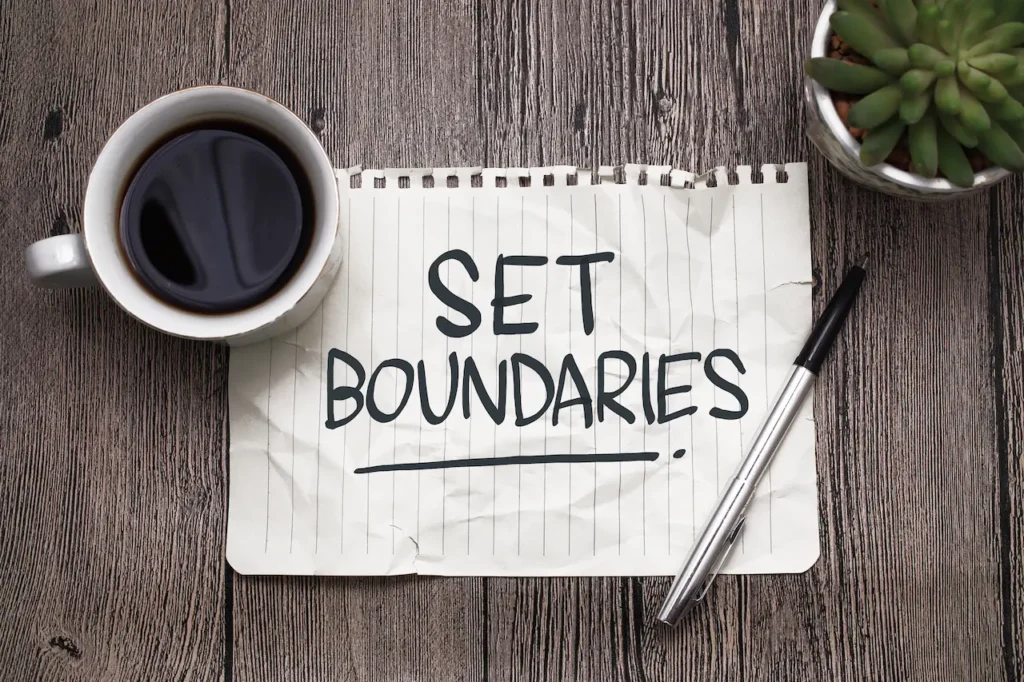Set boundaries to protect yourself emotionally and communicate your needs. How to set boundaries and stick to them are essential to maintaining self-esteem and establishing satisfying relationships. Setting and enforcing boundaries can be challenging, but is an important step to a happier lifestyle. This comprehensive guide will explain what boundaries are, why they are important and how to set and maintain them.
What are Boundaries?
Boundaries are limits that you set yourself in your relationships to define what you will and will not tolerate. They are guidelines on how you will be treated, and how others should be treated. Set boundaries as an act of respect and self-care. It allows you to express your needs and protect your emotional wellbeing.
Boundaries Can be Classified into Different Types
Boundaries may take many forms.
- Boundaries Physical: Relates personal space and physical contact. You might not be comfortable hugging or being near others.
- Emotional boundaries: Include your feelings and the way you treat others emotionally. You might, for example, set a limit on not accepting hurtful remarks from family or friends.
- Time Limits: How you spend your time and effort is important. It could be as simple as saying no to additional work projects to maintain a balance between work and life.
- Material Boundaries – Include your possessions and other resources. You might, for example, decide not to lend out your possessions.
- Intellectual Boundaries: Relate your thoughts and ideas. It is important to be able to express your opinion without fear of being judged.
You can protect certain areas of your life by understanding the different types of boundaries.

Boundaries are Important
It is important to have clear boundaries for many reasons.
- Self Protection: Boundaries protect you from toxic relationships and negative influences.
- Better Relationships: Clarified boundaries promote mutual respect, understanding and communication.
- Self-Esteem Increased: By expressing your need, you can reinforce your self-esteem and sense of worth.
- Reduced stress: Boundaries allow you to prioritise your needs and reduce feelings of burnout or overwhelm.
Boundaries and Culture
How you set and perceive boundaries can be influenced by your cultural background. In some cultures, community and family may be more important than individuality. This can make it difficult to assert your personal needs. Understanding cultural influences will help you to better define your boundaries.
Six Tips to Set and Maintain Healthy Boundaries
You can avoid being abused or mistreated by setting strong boundaries. Here are some practical strategies to help you establish and maintain personal boundaries.
1. Practice Self-Awareness
It is important to be aware of yourself to set boundaries. Examine your past to identify what caused you discomfort, frustration or resentment. Consider:
- Identify Triggers – What triggers are there? Which situations or behaviors of others cause negative feelings in you? Understanding these triggers can help you define your boundaries.
- Reflect upon Values: Which values are important to you? Boundaries are often a result of personal values and beliefs.
- Monitor Your Emotional Reactions: Pay Attention to Your Emotions in Different Interactions. Anger, sadness or anxiety are all signs that you need to adjust your boundaries.
You can better communicate your boundaries once you understand your triggers, values and preferences.
2. Start Slowly and Be Realistic
It’s important to begin slowly when setting boundaries. Introduce your boundaries slowly to avoid overwhelming you or others. Here’s how:
- Start with Small Boundaries: To build confidence, start by setting smaller boundaries. Start with small requests if, for example, you have trouble saying no.
- Be Ready for Resistance: You may encounter resistance from some people when you enforce boundaries. Be prepared for these reactions, and remember that they are a normal part of the process.
- Set Realistic Consequences: Consider the consequences before a boundary has been violated. If necessary, be prepared to enforce your boundaries.
3. Be Assertive
Effective boundary setting requires assertive communication. It is important to express your needs, wants and thoughts. Here are a few tips:
- Use the “I” statements: Frame requests or concerns from your perspective. Instead of blaming someone else, you could say “I feel overwhelmed by …”
- Be Calm and Confident. Maintain a calm demeanor when discussing boundaries. Your confidence in how you deliver your message can affect the way others react.
- Active listening: Listen to the other person. Recognize their feelings, but remain firm in your demands.
4. Keep your communication clear, concise, and consistent
Communication of boundaries must be consistent and clear. How to communicate boundaries clearly:
- Keep it Simple: Use simple language to clearly articulate your boundaries. Avoid lengthy explanations, which may cause confusion or lead to negotiation.
- Communicate Promptly: Share Your Boundaries as Soon as Possible, Especially in New Relationships. The sooner you communicate your needs to others, the more likely there will be misunderstandings.
- Repeat as Needed: Do not hesitate to remind someone of their limits if they cross a boundary. Consistency strengthens your commitment to maintain boundaries.
5. Self-Love is a Practice
Maintaining healthy boundaries requires a strong foundation of love for yourself. You can protect your emotional well-being by cultivating a positive image of yourself.
- Take time to care for yourself: Whether it is meditation, exercise or hobbies that you enjoy, make sure to take the time.
- Reframe Negative Self-Talk: Try to reframe your negative thoughts. Remember that you deserve respect and care.
- Surround yourself with support: Find relationships with people who encourage you and respect your boundaries. Positive influences can reinforce your self-worth.
6. Stop toxic relationships
Setting boundaries can reveal the health of your relationship. It may be time to evaluate the relationship if someone consistently disrespects your boundaries.
- Determine the Value of the Relationship: Ask yourself if the relationship is positive for you. It may be time to move on if the relationship consistently causes you stress or harm.
- Trust your instincts: Listen closely to what you feel about the relationship. Prioritize your wellbeing if the relationship feels toxic or draining.
- If you need to, seek closure: Terminating a toxic relationship is not easy. You can either have a discussion to explain your choice or you can simply distance yourself.

Seeking professional support for setting boundaries
Consider seeking professional help if you have difficulty establishing and enforcing personal boundaries. A therapist or counsellor can help you identify the underlying issues and develop effective boundary-setting strategies. A therapist can provide a safe place to discuss your feelings and experiences regarding boundary violations.
Benefits of Professional Support
- Personalized Guidance: A Therapist can offer tailored strategies depending on your unique situation.
- Emotional support: A professional who is supportive can help you with the challenges of setting boundaries and enforcing them.
- Accountability Regular sessions will help you to maintain your accountability in practicing boundary setting skills.
We offer accessible services to support you in your quest for healthier relationships and self-discovery. Do not hesitate to seek support if you are feeling overwhelmed or uncertain about setting boundaries.
Ten Steps for Setting Boundaries And Sticking To Them
It can be difficult to set boundaries, especially if your personality is accustomed to being accommodating. Here are 10 steps that will help you successfully set and maintain your boundaries:
1. Take a moment to think before you respond
Take a pause when you are faced with a request which makes you uncomfortable. Saying “I need time to think” instead of immediately responding gives you space to reflect on your feelings and come up with a decision that is in line with your boundaries.
2. Choose Your Moments With Care
Choose specific situations in which you feel comfortable saying no. It’s okay to delay asserting your boundaries until you are more confident.
3. Concentrate on yourself
Instead of criticizing someone else, explain your reasons for saying no by focusing on your own needs. Instead of saying “You are asking too much from me,” use statements such as “I am unable to handle more at this time.”
4. Recognize Their Feelings
Acknowledge their feelings if someone reacts negatively towards your boundaries. Do not become defensive. Say, “I can understand your frustration and wish I could offer some help, but unfortunately I cannot.”
5. Keep it Short and Simple
Avoid lengthy explanations for your decisions. When pressed, simply say “I’m uncomfortable with that.” This is often more effective than an elaborate explanation.
6. Keep Calm under Pressure
Even if someone reacts violently, maintain a calm demeanor. Intense responses can escalate a situation. Use grounding techniques to stay grounded.
7. Make Your Own Choices
Do not blame others for your lack of ability to set boundaries. Recognize that your response to difficult situations is entirely up to you.
8. You can learn from Others
Contact family or friends who have successfully managed boundaries. Understanding their journey can give you valuable insight and strategies.
9. Confidence Begins With Small Steps
Start by practicing boundaries with low-stakes situations and gradually work your way up to the more difficult ones. Celebrate your success along the way. This will boost your confidence.
10. Accept Guilt
You may feel guilty about changing old habits, especially if in the past you have been accommodating. You will eventually get over your guilt. Focus on the positive results of your efforts to set boundaries.

Conclusion
It is important to set boundaries to maintain healthy relationships and protect your emotional well-being. Although it might be uncomfortable initially, the benefits are worth it.
The benefits far outweigh any initial challenges. You can establish healthy boundaries by practicing self-awareness and being assertive.
As you discover yourself, embrace the journey to self-discovery. You will learn how to assert your wants and set the boundaries necessary for your happiness. It’s not only about saying “no”, but also about respecting others and fostering positive interactions.
Consider seeking professional help if you are struggling to set boundaries, or feel overwhelmed by toxic relationships. You can learn the skills you need to navigate your relationships confidently and clearly with guidance and encouragement. The ultimate goal is to live a life in alignment with your values and that enhances your wellbeing. You deserve to have relationships that respect your boundaries and encourage your growth.



